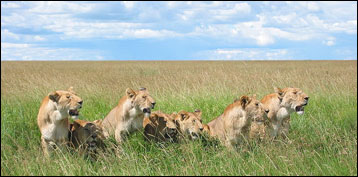Safari health & safety mistakes
 Worrying that lions will
jump into your vehicle
Worrying that lions will
jump into your vehicleIt's extremely unlikely
You are more likely to be in an automobile accident back home than being attacked by a lion. Unless a lion's traditional food (game) is scarce, it will seldom seek human meat, for various reasons, including the following.
-
Odor
We humans smell awful to lions. So do the gas fumes of your safari vehicle. - We're not a menu priority
The flesh of safari animals like elands, wildebeests and wart hogs is considerably meatier and more abundant than that of humans in safari parks. It's also tastier. - Provocation
In rare cases when a lion does attack humans in a game preserve, it is almost always because the beast was provoked or cornered. - Exception to the rule
Over the last few decades in Tanzania, lions have ended the lives of over 500 villagers, herders and farmers outside the animal-rich safari reserves. The primary reason is that the population of the animals such as elands and zebras that lions traditionally eat is quite low (due to hunting by the natives) in those human-inhabited areas. Hungry, the lions attack humans and their cattle.
Be escorted at night
If you are instructed to call the main lodge for an employee to escort you between your cottage or tent and main lodge building at night, do it. Sometimes unescorted guests are knocked down, trampled, or at least severely frightened by elephants and other wild animals that pass through the grounds in the dark.
Stay in your vehicle
Don't get out of your private vehicle if the reserve forbids it. You don't know what might be lurking in the bushes.
Not bringing sunglasses, sunscreen, eyedrops and mosquito repellent
Sunglasses and sunscreen
You will be out on game drives for hours at a time - and the bare safari earth intensely reflects the sun's rays. Protect your eyes (by wearing sunglasses that effectively block ultraviolet rays) and sunscreen (SPF rating of 15 or higher).
Eye drops
Pack them, particularly if you wear contact lenses. The safari air carries fine-particle dust.
Malaria medication
Take it. Normally, for it to be effective, you need to start the preventive medication a week or two before your arrival.
Mosquito repellant
Mosquitoes are the chief source of malaria (and dengue fever), so use a good repellent, one containing the ingredient DEET. For further protection, wear long pants and long-sleeved shirts from after 3 p.m. and before 10 a.m.
Bush dinner germs
Sanitizer gel
In bush dinners and sundowners, you are in a wild setting, usually far from your lodge or camp. There will be no faucets for washing your hands - and not every event sets up a small table with soap, bowl and hot-water pitcher. So always carry a small bottle of hand-sanitizer gel.


